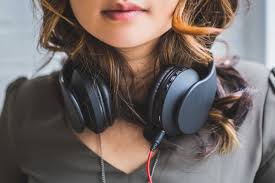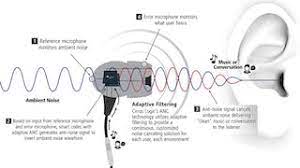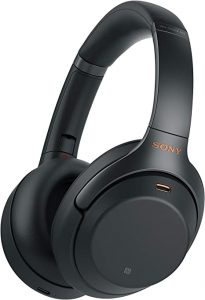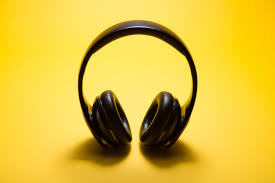Table of Contents
Noise cancelling headphones are designed to reduce ambient noise levels, making it easier to hear your music or other audio without being disturbed by background noise.
]
What Are Noise Cancelling Headphones?
Noise cancelling headphones work by generating a sound wave that cancels out the background noise, making it less audible. While they will not completely eliminate all noise, they can help to reduce the overall noise level that you are exposed to, which can help to protect your hearing. Additionally, noise cancelling headphones can also help you to focus on the task at hand by reducing distractions from the surrounding environment. This can be especially beneficial when working in a noisy office or studying in a library. Noise cancelling headphones can also be helpful when traveling on an airplane or in a car, as they can help to reduce the amount of noise from the engine and other passengers.
Active and Passive Cancelling Headphones
There are two main types of noise cancelling headphones:
- active and
- passive.
Active noise cancellation uses electronics – microphones and speakers – to generate a sound wave that cancels out ambient noise (such as the hum of an airplane engine). On the other hand, passive noise cancellation relies on sound-isolating materials (such as ear cups that fit snugly over your ears) to block out ambient noise.n Passive Noise Cancellation seals out external noise with the help of ear cups that fit snugly over your ears. This can be found in both over-ear headphones and earphones where the bud goes into your ear and blocks outside sound.
Passive noise cancellation can still provide some noise reduction, but it won’t be as effective as active noise cancellation.

Noise cancelling headphones can be more expensive than traditional headphones. If you’re on a budget, look for a pair of passive noise cancelling headphones. Noise cancelling headphones can make it difficult to hear sounds around you, which can be dangerous in some situations (such as when crossing the street). If you’re using noise cancelling headphones in a situation where you need to be aware of your surroundings, make sure the volume is low enough that you can still hear outside noise.
Do Noise Cancelling Headphones Protect Hearing?
Generally, it’s considered that noise cancelling headphones can help protect your hearing by reducing the amount of background noise that you are exposed to. This can help to reduce the risk of developing noise-induced hearing loss. Noise cancelling headphones work by generating a sound wave that cancels out the background noise, making it less audible. While they will not completely eliminate all noise, they can help to reduce the overall noise level that you are exposed to, which can help to protect your hearing.
Can noise cancelling headphones hurt your hearing?
There are a few potential disadvantages to using noise cancelling headphones. One is that they can be more expensive than traditional headphones. Additionally, noise cancelling headphones can require more battery power than traditional headphones, so you may need to charge them more frequently. Finally, some people find that the sound quality of noise cancelling headphones is not as good as traditional headphones.
Noise cancelling headphones can be comfortable to wear for long periods of time. However, it is important to choose a pair of headphones that fit well and are not too tight. Additionally, some people find that noise cancelling headphones can cause them to feel dizzy or lightheaded, so it is important to take breaks if you start to feel this way.
The Eardrum Suck Sensation
It’s a phenomenon that happens with active noise canceling headphones and earphones like the Bose Quiet Comfort 35 (check the price on amazon), or the Bose Quiet Control 30 (check the price on amazon), or the Sony WH-1000XM3 (check the price on amazon).

The reason why I want to talk about this is that for something that could potentially be a deal breaker in purchasing such headphones or earphones, which can get really expensive, mind you, it surprises me how reviews never seem to mention it. Eardrum suck refers to the rather uncomfortable pressure you feel in your ears when using active noise canceling headphones. It’s a sensation that’s very similar to what you’d feel when you’re on an airplane or when you’re riding a high speed elevator, except that it’s a lot more uncomfortable. In fact, it’s so bad for me that I often ended up getting headaches or became dizzy after using such headphones for a while, which is the main reason why I’ve stopped using them.
Technical Description of the Phenomenon
An excellent article of Brent Butterworth at soundstagesolo.com explained exactly what eardrum suck is. Basically, without getting too technical about it, eardrum suck is caused by a disruption and the balance of sound you’re used to hearing, and that this disruption is, you can say, a byproduct of the process that goes inside your headphones that allows it to cancel out whatever outside noise it picks up. The article also notes how there isn’t really a change in pressure and that the discomfort is just caused by the disruption in the balance of sound we just mentioned. In order to understand this better, we need to know how active noise canceling works in a nutshell. Microphones in your headphones pick up the outside noise, which is then passed on to the noise canceling circuitry inside, which in turn generates a sound wave that is 180 degrees out of phase relative to the noise. Combining these two waves will result to silence. Well, this can sound counterintuitive.
Now, while the entire process does its job of canceling out outside noise, it also produces a type of squeal feedback, like the type of squeal you hear when using microphones. In order to eliminate this feedback, noise canceling headphones use a filter to get rid of it, and it is this filter that creates the disruption in the balance of sound, which in turn is the one that causes eardrum suck.
Final Thoughts
So, using active noise canceling headphones could have inevitable byproduct and trade off that could potentially make or break your purchase decision and that which nobody seems to be talking about.
Before you go by active noise canceling headphones or earphones, I highly suggest you go try a test unit out at your local store or perhaps borrow from someone who has it to see if it’s something you can tolerate or not!
